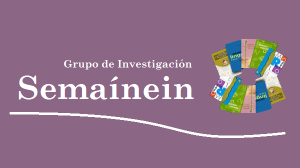About us

The inter-university and consolidated group of the Andalusian Research Plan “Semaínein (code HUM 147)”, is subsidized, since its foundation in 1994, by the Junta de Andalucía. Although officially attached to the area of General Linguistics of the Department of Philology of the University of Cádiz, under the direction of Prof. Dr. Miguel Casas Gómez (main researcher and head of the group), a total of thirteen researchers are involved in this group, mainly from the Universities of Cádiz, Alcalá and Granada (Ceuta campus).
One of the main lines of work of “Semaínein” focuses on the theoretical description and semantic analysis of the lexical level. In this sense, and given that the current lexical semantics differs, precisely from classical lexicology, by the addition of new contents to those traditionally studied, such as the extensive field of word formation, the semantic bases and epistemological foundations of terminology and, in particular, the diversity of aspects covered by linguistic variation from the semantic point of view, our research group has tried to cover each of these areas, specifically the following lines:
- Epistemological problems of semantic theory in general and lexical theory in particular;
- Historiography of semantics;
- Description and analysis of the relationships between sign meanings;
- Studies on the mechanisms of word formation and, fundamentally, their interweaving with other linguistic disciplines;
- Theoretical, methodological and practical aspects of technical language, with particular attention to the “relationships” and principles that characterise terminologies;
- Theoretical considerations on linguistic variation, especially with regard to its delimitation at the lexical level and the proposal of a variationist typology
- Studies on lexical availability in relation to linguistic contact and interculturality
From these new fields of lexical semantics, we highlight the last two lines mentioned, which highlight the interrelationship between semantics and sociolinguistics and which are basic to understanding certain linguistic concepts. This is a new orientation of semantics with the application of sociolinguistic aspects, techniques and methods, which ultimately serve to corroborate in practice some of the theoretical approaches to semantics and, consequently, to provide new solutions to the treatment of semantic phenomena. In this way, sociolinguistics not only makes sense in and of itself through its scientific status and, above all, its practical and applied results, but also in the service of other disciplines that contain the central problems of linguistics, such as semantics or syntax.
But, in addition to this main line of the group, a number of research projects have been or are being developed in relation to the other fields of research listed. In fact, simultaneously with the description and analysis of each of the lexical relations, different approaches to the study of semantic relations at the morphological, suborational, orational and textual linguistic levels are currently being carried out.
On the other hand, at the same time that different researches are carried out on the semantic structuring of the phraseological units and the semantic relations existing between them, different aspects of general lexicography and concerning the lexicographical treatment of the phraseological units in particular have been analysed, tasks that are essential to achieve the marked objective of elaborating different dictionaries of phrases for the teaching of Spanish. Of these, several dictionaries have already been published, all of them aimed at teaching Spanish as a foreign language. In fact, the problems in the acquisition of Spanish as a foreign language, the training of teachers as a foreign language and the methodology for teaching and learning foreign languages have become, for the members of “Semaínein” research group, specific lines of work in the field of applied linguistics, both from the point of view of their research tasks and with regard to various teaching activities.
With regard to the fields of pragmatics and discourse analysis, we would like to highlight the research carried out in the line “Pragmatics and levels of meaning” on the distinction between levels of meaning of the system and levels of meaning of the discourse, on the one hand, and between static linguistic levels and dynamic linguistic levels, on the other. In addition, in the field of pragmatics, different approaches have been made to language interdiction, irony, interjectification, and the use of the language.
All these approaches are complemented by others of a historiographic nature, fundamentally centred on the corresponding historical and historiographical reviews of the problems, aspects, concepts or linguistic terms that arise throughout the theoretical research.

